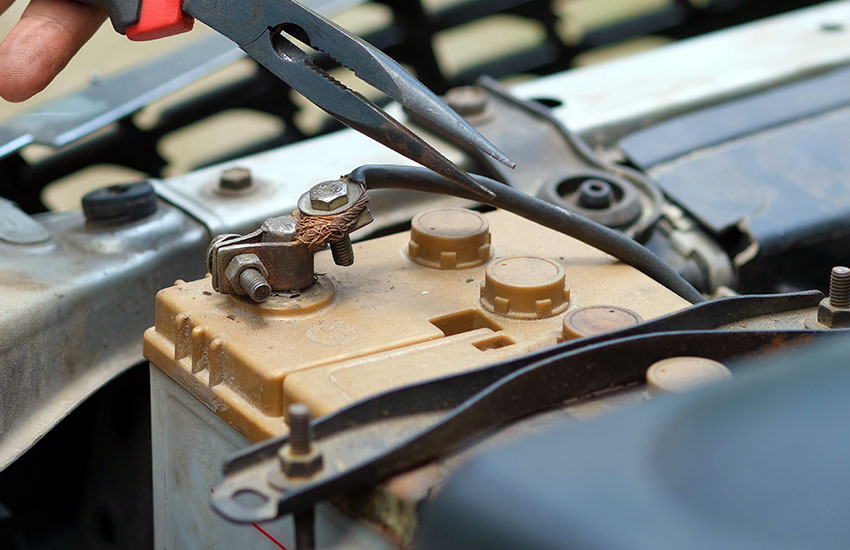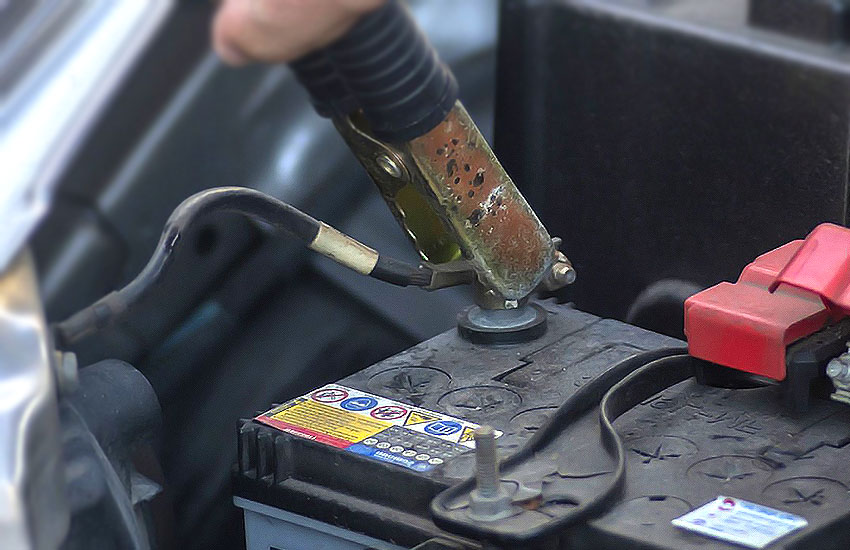Using the wrong size battery can lead to various issues in your car, such as electrical system damage and failure to start the vehicle. Car batteries play a crucial role in ensuring the smooth functioning of a vehicle.
They provide the necessary electrical power to start the engine, operate the lights, and power other electrical components. However, selecting the correct battery size is vital for the optimal performance of your car. Installing the wrong size battery can cause a range of problems that can affect the electrical system and overall functionality of your vehicle.
We will explore the potential consequences of using the wrong size battery in your car and why it is essential to choose the right one. Understanding these implications can help you make informed decisions when it comes to maintaining your vehicle’s battery health.

Effects Of Using The Wrong Size Battery In Your Car
When you put the wrong size battery in your car, it can lead to several problems. Let’s take a look at what could happen if you make this mistake.
Electrical System Damage
The electrical system in your car is designed to work with a specific battery size. If you use a battery that’s too big or too small, it can cause damage to this system. One common issue is overloading.
When the battery is too large, it can send too much power to the electrical components, causing them to malfunction or even burn out. On the other hand, a battery that’s too small may struggle to provide enough power, leading to voltage drops and potential short circuits.
Engine Performance Issues
Your car’s engine relies on the battery to start and operate properly. Using the wrong size battery can affect its performance. For example, if the battery is too small, it may not have enough power to start the engine, leaving you stranded.
Even if the engine does start, it may not run as smoothly as it should, leading to reduced power output and poor fuel efficiency. In some cases, using the wrong size battery can even cause damage to the engine itself.
Potential Safety Hazards
Using the wrong size battery in your car can also pose safety risks. Malfunctioning electrical systems can lead to unpredictable behavior on the road, increasing the risk of accidents. Additionally, if the battery is damaged or overheats due to being the wrong size, it could potentially catch fire, posing a serious hazard to you and your passengers.
Increased Maintenance Costs
Finally, using the wrong size battery can end up costing you more money in the long run. Not only may you need to replace the battery sooner due to damage or wear and tear, but you may also incur additional expenses repairing any damage caused to the electrical system or engine. By using the correct size battery from the start, you can help avoid these unnecessary costs.
Signs Of Using The Wrong Size Battery

Diminished Electrical Performance
When you use a battery that’s not the right fit for your car, you might notice your electrical components acting up. These include things like your headlights, interior lights, and power windows.
They might not shine as brightly as they should, or they could flicker unexpectedly. Your radio might cut out, or your power seats might move sluggishly or not at all. These are signs that your battery isn’t supplying enough power to keep everything running smoothly.
Struggling Engine
Another clue that you’ve got the wrong battery is a car that’s having a hard time starting. Instead of roaring to life with a quick turn of the key, your engine might hesitate, crank slowly, or refuse to start altogether.
This happens because the battery isn’t providing enough juice to power the starter motor, which gets your engine going. So, if you find yourself stranded in the driveway or parking lot with a car that won’t start, it could be because of the wrong-sized battery.
Dashboard Warnings
Modern cars are pretty smart—they’ll often let you know if something’s not quite right. If you’ve installed the wrong battery, your car might throw up a warning light on the dashboard. This could be something like a battery icon, indicating that there’s a problem with the electrical system. Don’t ignore these warnings—pay attention to what your car is trying to tell you!
Steps To Take If You Accidentally Use The Wrong Size Battery
So, you’ve accidentally put the wrong size battery in your car. Don’t panic! Here are some easy steps you can take to address the situation:
Turn off the Engine Immediately
The first thing you should do is turn off your car’s engine. This helps prevent any further damage to your vehicle’s electrical system or engine. If the wrong size battery is causing any issues, stopping the engine can help minimize the risk of more serious problems occurring.
Disconnect The Battery
After turning off the engine, you’ll want to disconnect the battery from your car’s electrical system. This is important for safety reasons and to prevent any electrical issues from worsening. To do this, simply locate the battery in your car’s engine compartment and using the appropriate tools, disconnect the negative (-) terminal first, followed by the positive (+) terminal.
Inspect For Any Damage
After disconnecting the battery, it’s crucial to inspect for any damage caused by using the wrong size battery. Check the battery terminals and cables for any signs of corrosion, loose connections, or melted plastic. Ensure that the battery itself is not swollen or leaking any fluids. If you notice any damage, it’s best to take appropriate measures to repair or replace the affected components.
Consult A Professional
If you are unsure about how to handle the situation or if you suspect any damage to your vehicle, it is highly recommended to consult a professional. A qualified mechanic or automotive specialist will have the expertise to assess the situation properly and provide appropriate guidance. They can help you determine if any further steps are necessary to avoid any potential problems.
Importance Of Using The Correct Size Battery
Choosing the right size battery for your car is crucial to ensure optimal performance, prevent electrical problems, and maintain safety. The wrong size battery can lead to various issues that may affect the overall functioning of your vehicle. Let’s explore the significance of using the correct size battery in more detail.
Optimal Performance And Efficiency
Using the correct size battery enables your car to operate at its optimal performance and efficiency. A properly sized battery provides the necessary power to start the engine and supply energy for the vehicle’s electrical components. When the battery is the wrong size, it may struggle to meet the demands of the car’s electrical system, leading to poor performance and decreased fuel efficiency.
Preventing Electrical Problems
Installing the wrong size battery can result in various electrical problems such as overcharging or undercharging, which can damage the vehicle’s electrical system. Incompatible batteries may also lead to issues with power distribution and cause malfunctions in crucial electronic components. By using the correct size battery, you can avoid these potential electrical complications, ensuring that your vehicle operates smoothly and reliably.
Ensuring Safety
The correct size battery is designed to fit securely in the battery compartment, reducing the risk of accidents or hazards caused by loose or improperly fitted batteries. Opting for the right size battery also minimizes the chances of leaks or emissions of harmful gases. This helps maintain a safe environment within the car and reduces the risk of injuries or damage to the vehicle.
Factors To Consider When Choosing A Battery
When it comes to choosing a battery for your car, there are several factors you need to consider. Making the wrong choice can have adverse effects on your vehicle’s performance and potentially even cause damage. In this blog post, we will explore the key factors to keep in mind when choosing a battery.
Car Manufacturer’s Recommendation
The first and most important factor to consider is the car manufacturer’s recommendation. Each car model has specific requirements for battery size and capacity, and it is essential to adhere to these guidelines. The manufacturer’s recommendation ensures that the battery is compatible with your vehicle’s electrical system and provides optimal performance.
Battery Size And Capacity
The size and capacity of the battery are significant considerations. A battery that is too small may not provide enough power to start your car, while a battery that is too large may strain the electrical system. It is crucial to select a battery that matches the specified size and capacity for your vehicle. This information can usually be found in the owner’s manual or by consulting with a trusted mechanic.
Quality And Warranty
Quality and warranty are two essential factors to consider when choosing a battery. Investing in a high-quality battery ensures durability, long life, and reliable performance. It is worth spending a little more to get a battery from a reputable brand with a solid track record. Additionally, a good warranty offers peace of mind and protects you against any defects or premature failure.
Preventing Accidental Use Of The Wrong Battery
Understanding Your Car’s Battery Requirements
Before purchasing a new battery for your car, it’s essential to understand your vehicle’s specific battery requirements. Every vehicle has unique electrical needs, and choosing a battery that doesn’t meet those requirements can have dire consequences. To prevent the accidental use of the wrong battery, consider the following:
- Refer to the Owner’s Manual: Your car’s owner’s manual is a treasure trove of information, including the battery specifications you need. Take the time to read through it and locate the exact battery type, size, and other necessary details.
- Check Terminal Placement and Polarity: Different car models may have batteries with terminals and polarity configurations specific to their design. Make sure you understand your vehicle’s unique requirements to avoid installing an incompatible battery.
- Consider Climate and Driving Conditions: Climate and driving conditions can also impact the type of battery your car needs. Extremely cold or hot climates may require batteries with specific features like increased cold cranking amps or enhanced heat resistance.
Labeling And Organizing Batteries
Once you have the correct battery, it’s crucial to label and organize it properly to avoid confusion and accidental installation of the wrong battery. Here are some simple yet effective steps to keep your batteries organized:
- Use Color Coding: Assigning different colors to different battery types or sizes can make it easier to identify the correct one at a glance. For example, you can use colored electrical tape to mark each battery accordingly.
- Label Based on Vehicle Compatibility: Clearly label each battery with the make and model of the vehicle it’s compatible with. This will make it clear which battery is suitable for which vehicle, reducing the risk of accidentally using the wrong one.
- Store Batteries in Separate Containers: Keep batteries in dedicated containers or compartments to prevent accidental mixing and confusion. Clearly mark each container with the type and size of batteries it holds.
Seeking Professional Advice
If you’re unsure about the battery requirements for your car or want expert guidance to ensure you’re on the right track, don’t hesitate to seek professional advice. Auto shops, mechanics, or car battery specialists can provide valuable insights and recommendations tailored specifically to your vehicle’s needs. Their expertise will help you make an informed decision and minimize the risk of accidentally using the wrong battery.
By understanding your car’s battery requirements, properly labeling and organizing batteries, and seeking professional advice if needed, you can prevent the costly consequences of installing the wrong size battery. Take these precautionary steps seriously to ensure your car’s electrical system stays in good health and your vehicle operates reliably.
Final Words
Using the wrong size battery in your car can lead to various problems, including difficulty starting your vehicle, electrical system issues, and potential damage to the battery or other components. It’s crucial to choose the correct battery size for your car to ensure optimal performance and safety.
Be sure to consult your vehicle’s manual or a professional to avoid potential issues.


